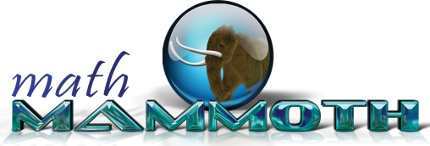How to solve basic percent word problems
These two video lessons give examples and full solutions to several basic percentage word problems, most of which involve the concept of PART/TOTAL = PERCENTAGE.
First I present three problems that all involve a discount. The first asks for the discount percentage, the second for the discount price, and the third for the original price.
Then I also solve a problem where the original price and a percentage price increase are given, and the new price is asked.
One basic principle that helps you solve these is this "formula": PART/TOTAL = PERCENTAGE. The first problem where a $14 shirt is discounted by $2 is solved by using that: the discount percent is found by converting the fraction 2/14 into a percentage.
I solve the second problem in two ways: first, by finding 10% of the original price, doubling that to find 20% of it, and lastly subtracting the result from the original price to get the discounted price. I also use the thought that if an item is discounted by 20%, then 80% of the price is left, so we can simply calculate 0.8 $14 to get the new, discounted price.
And to find the original price when the discount percentage and the discount amount are known, once again, PART/TOTAL = PERCENTAGE would work. Or, we can reason that if $3 is 15% of it, then $1 is 5% of it, and therefore 20 is 100% of it.
In the second video, we first find what percentage the area of one triangle is of the are of the other. Of course, to find the percentage, we simply write the fraction PART/TOTAL, and then convert that to a percentage.
Then we solve a problem involving an overtime pay that is 160% of the normal.
The last problem states, "3.1 is 14% of what number?" — a typical algebra textbook problem. Essentially, we need to find the TOTAL when the part and the percentage are known. One way to do that is to use the little "formula" PART/TOTAL = PERCENTAGE. In this case, we get 3.1/x = 0.14 or 3.1/x = 14/100, and it's easy to solve the latter equation with cross-multiplying.
See also
Simple interest — video lesson
Math Mammoth Grade 7 curriculum (pre-algebra)
Receive my monthly collection of math tips & resources directly in your inbox — and get a FREE Math Mammoth book!
You can unsubscribe at any time.
